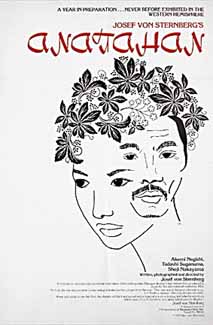| Anatahan | |
|---|---|
 American re-release poster | |
| Directed by | Josef von Sternberg |
| Screenplay by | Josef von Sternberg Tatsuo Asano |
| Based on | Anatahan by Michiro Maruyama |
| Produced by | Kazuo Takimura |
| Starring | Akemi Negishi Tadashi Suganuma Shōji Nakayama |
| Narrated by | Josef von Sternberg |
| Cinematography | Josef von Sternberg |
| Edited by | Mitsuzō Miyata |
| Music by | Akira Ifukube |
Production company | Daiwa Production Inc. |
| Distributed by | Toho |
Release date |
|
Running time | 92 minutes |
| Country | Japan |
| Languages | English Japanese |
| Budget | $375,000[2] |
Anatahan (アナタハン), also known by its on-screen title of The Saga of Anatahan, is a 1953 black-and-white Japanese war drama film directed by Josef von Sternberg,[3][4] with special effects by Eiji Tsuburaya. It was adapted by Sternberg from Younghill Kang's English translation of Michiro Maruyama's nonfiction account of the seven years he and a group of World War II Japanese holdouts spent on Anatahan island, which was then part of the South Seas Mandate of Imperial Japan and is now one of the Northern Mariana Islands of the United States. This story also inspired the 1998 Japanese novel Cage on the Sea.
The film was the final one directed by Sternberg (although Jet Pilot, which he worked on earlier, was his final film to be released), and he had an unusually high degree of control over the project, which was made outside the studio system, allowing him to not only direct, but also to write, photograph, and narrate. It opened modestly well in Japan in 1953 and was screened in competition at the 14th Venice International Film Festival, but it did poorly in the US, and Sternberg continued to re-cut the film for four more years. Eventually, he abandoned Anatahan and went on to teach film at UCLA for most of the remainder of his life.
- ^ (in Japanese) Jmdb.ne.jp Accessed 10 February 2009
- ^ "'How We Beat 'Em Pix' Irk Nips, So They Slug U.S. With Own Hay-Makers". Variety. August 19, 1953. p. 2. Retrieved March 16, 2024 – via Internet Archive.
- ^ Crowther, Bosley (May 18, 1954). "The Screen in Review; 'Ana-ta-han,' Filmed in Japan, at the Plaza". The New York Times.
- ^ "Screen: Von Sternberg's Coda". The New York Times. May 19, 1977.